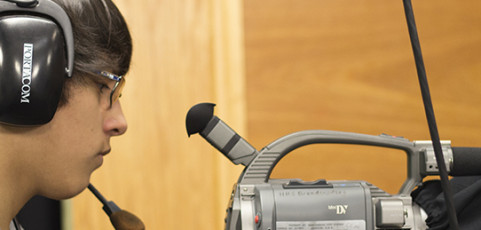Selecting the best candidate to advise a student media program involves a range of considerations. Finding journalism teachers with the necessary background and training helps to ensure students will have the best knowledge and skills to produce quality products. Those products are created for an outside audience rather than just teacher assessment within the classroom.
Teachers with the knowledge who know how to create excellent publications help students be responsible staff members — ones operating with accuracy, truth and integrity
Because advisers will supervise one or more of the school’s most public activities, administrators need to take great care in the hiring process to select individuals who can teach and train student journalists. Administrators must understand hiring advisers who do the work is detrimental to students’ learning and defeats the purpose of student media. Journalism teachers must possess the ability to focus more on the students and their learning process rather than on the product itself.
Principals should look for teachers whp display the ability to use multiple instructional methods and can facilitate numerous learning activities simultaneously. The journalism classroom involves more one-on-one interaction and coaching than a traditional class.
Ideally, candidates should have a journalism degree or related background with a knowledge of scholastic media law and ethics.
Top-notch advisers show professionalism, demonstrate organizational and time management skills, perform well under pressure and have the courage to empower students to think for themselves.
Advisers must:
• Let students lead in making content decisions and critique the outcome;
• Understand the First Amendment and legal and ethical issues related to scholastic journalism;
• Guide students to an understanding of the need for ethical behavior in all undertakings;
• Adhere to the Journalism Education Association’s Adviser Code of Ethics;
• Adapt to last minute-changes;
• Be energetic, passionate, positive, dedicated and open-minded;
• Continue to develop professionally by attending local, state, regional and national conferences and workshops as well as by earning certification.
Supporting the adviser
Administrators and advisers should be partners in education and not adversaries.
Administrators should be available to students during the entire reporting process. Principals should support students’ First Amendment rights as well as understand that real news isn’t always positive. When student reporters separate facts from rumors, students and staff are better informed of the issues through accurate and thorough journalism.
When administrators interfere with publication, the issue often becomes part of a larger stage. Students who feel passionately about their work will find an audience through other means.
Additionally, administrators should support and provide budgeting for participation in state and national journalism organizations.
Journalism advisers often learn much of their trade by talking to other advisers either locally or across the nation. Administrators should also support the continuing education of journalism teachers by encouraging them to find a Personal Learning Network or Professional Learning Community. Advisers may also need release time to observe other journalism teachers and media professionals.
See also:
Journalism Educator Standards
Common Core State standards
Ties to educational Initiatives
Partnership in 21st Century skills
Resources
• Quill and Scroll membership information
http://quillandscroll.org/school-charters
• JEA membership information
http://jea.org/
• National Scholastic Press Association membership information
http://www.studentpress.org/nspa/membership.html
• Columbia Scholastic Press Association membership information
http://www.columbia.edu/cu/cspa/docs/join-cspa/index.html#N10013
The time and duties required of advising are separate from and in addition to regular classroom teaching responsibilities and curriculum development. Justification for a stipend comes from the production and advising aspects of journalism, which is different from classroom teaching. The production aspect involves advising student media; students plan and produce content as a result of what they learn in the classroom.
The main factor is time required for work nights, production sessions and editing activities students need beyond the school day to produce a newspaper, magazine, website, yearbook, broadcast and other media. This might include work nights, production sessions, editorial board meetings, summer planning, workshops, conferences and more.
Another key element is financial responsibility. While often not considered part of the teaching/learning curriculum, advisers must research its printing options and entertain bids for printing companies, keep records of all financial transactions and plan and implement fundraisers as needed.
In order for students to create quality products that come out in a timely manner, advisers devote late nights and weekends to respond to their communications. That differs from traditional teaching duties such as planning lessons, grading assessments and communicating progress. In class, students learn journalism; outside class, they spend additional time applying what they have learned to create the product. In the same way a theater teacher earns a separate stipend for directing the school play, journalism teachers should earn a separate stipend for advising student publications.
Resources
• Evaluating Student Media Advisers
http://jeapressrights.org/2008documents/2008Teachingmaterials/2008Teaching/jeaadvsereval.html
• Model Guidelines for Media Advisers
http://jea.org/home/for-educators/model-guidelines/
• Standards for Journalism Educators
http://jea.org/home/for-educators/standards/
• Society of Professional Journalists Code of Ethics
http://www.spj.org/ethicscode.asp
• JEA Adviser Code of Ethics
http://www.jeasprc.org/wp-content/uploads/2012/03/JEAadvisercodeof-ethics-2012.pdf
• Stirring the Pot
http://www.splc.org/pdf/StirringthePot_Buller.pdf




